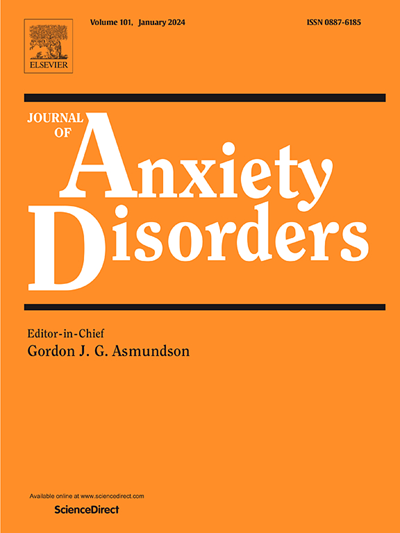The unique autonomic signatures of savoring meditation for anxiety reduction: A pilot randomized controlled trial
IF 4.5
2区 医学
Q1 PSYCHIATRY
引用次数: 0
Abstract
Anxiety disorders are often characterized by excessive sympathetic activation and dysfunction. While breathing relaxation reliably reduces anxiety by dampening sympathetic activity and enhancing parasympathetic tone, the autonomic signatures underlying positive emotion interventions, such as savoring meditation, remain less understood. In this pilot randomized controlled trial, we recruited 44 participants with probable generalized anxiety disorders (GAD) by questionnaires (GAD-7 score ≥ 10, which represents moderate or higher anxiety severity), who were assigned to a savoring meditation (n = 22) or a breathing relaxation (n = 22) intervention. We measured heart rate variability (HRV) indicators (respiratory sinus arrhythmia, RSA; low-frequency HRV, LF; the low-frequency/high-frequency ratio, LF/HF) and self-reported emotional states (happiness, anxiety, sadness, calmness) before and after the intervention. Linear mixed models with multiple imputation examined outcome change between and within conditions. The savoring group exhibited increased sympathetic and decreased parasympathetic activity (significantly lower RSA, higher LF and LF/HF), contrasting with the relaxation group’s pattern. Both interventions resulted in significant and similar reductions in anxiety after worrying. These preliminary results suggest that savoring meditation for anxiety reduction may have unique autonomic signatures, offering novel insights for positive emotion interventions in anxiety research.
享受冥想减轻焦虑的独特自主特征:一项试点随机对照试验
焦虑症通常以交感神经过度激活和功能障碍为特征。虽然呼吸放松通过抑制交感神经活动和增强副交感神经张力来可靠地减少焦虑,但积极情绪干预背后的自主信号,如享受冥想,仍然不太清楚。在这项试点随机对照试验中,我们通过问卷调查(GAD-7得分≥10,代表中度或更高的焦虑严重程度)招募了44名可能患有广广性焦虑症(GAD)的参与者,他们被分配到品味冥想(n = 22)或呼吸放松(n = 22)干预。我们测量了心率变异性(HRV)指标(呼吸性窦性心律失常,RSA;低频HRV, LF;干预前后的低频/高频比(LF/HF)和自我报告的情绪状态(快乐、焦虑、悲伤、平静)。多重输入的线性混合模型检验了条件之间和条件内的结果变化。与放松组相比,品尝组表现出交感神经活动增加,副交感神经活动减少(显著降低RSA,提高LF和LF/HF)。两种干预措施都导致焦虑后焦虑的显著减少。这些初步结果表明,通过品味冥想来减少焦虑可能具有独特的自主特征,为焦虑研究中的积极情绪干预提供了新的见解。
本文章由计算机程序翻译,如有差异,请以英文原文为准。
求助全文
约1分钟内获得全文
求助全文
来源期刊

Journal of Anxiety Disorders
Multiple-
CiteScore
16.60
自引率
2.90%
发文量
95
期刊介绍:
The Journal of Anxiety Disorders is an interdisciplinary journal that publishes research papers on all aspects of anxiety disorders for individuals of all age groups, including children, adolescents, adults, and the elderly. Manuscripts that focus on disorders previously classified as anxiety disorders such as obsessive-compulsive disorder and posttraumatic stress disorder, as well as the new category of illness anxiety disorder, are also within the scope of the journal. The research areas of focus include traditional, behavioral, cognitive, and biological assessment; diagnosis and classification; psychosocial and psychopharmacological treatment; genetics; epidemiology; and prevention. The journal welcomes theoretical and review articles that significantly contribute to current knowledge in the field. It is abstracted and indexed in various databases such as Elsevier, BIOBASE, PubMed/Medline, PsycINFO, BIOSIS Citation Index, BRS Data, Current Contents - Social & Behavioral Sciences, Pascal Francis, Scopus, and Google Scholar.
 求助内容:
求助内容: 应助结果提醒方式:
应助结果提醒方式:


